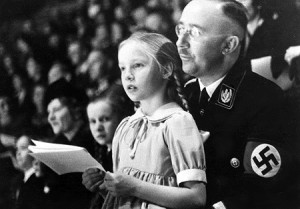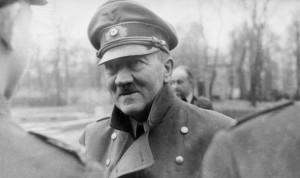Edited and with Commentary by Katrin Himmler and Michael Wildt
The Letters of Heinrich Himmler
The letters of Heinrich Himmler to his wife, Marga —published for the first time in English, along with her responses— combine to constitute a comprehensive correspondence from their first encounter in 1927 to the end of the war in 1945. The early letters at first seem extremely trite; nothing suggests that the Heinrich Himmler of 1927 would later develop into a mass murderer. Two rather unpretentious people, one a party functionary of the NSDAP and the other a divorced nurse, meet at the end of the 1920s and declare their love for each other in numerous letters. They marry, establish a self- sufficient business [poultry farming— Trans.] in the country, have a children and later take in a foster child. During the following years, while the husband is mostly traveling on official business, the wife stays at home, cares for the children and the house, and looks after the business of the farm. Over time the letters become more earnest: the husband’s career is prospering; the couple corresponds about daily worries; they telephone each other almost every day, even after the husband has had a mistress for a long time and conceived children with her. The war appears only sketchily in these letters: she writes of nights during the bombardments of Berlin; he writes about the “lot of work” he has to do on the Eastern Front.
Once it becomes clear to him that the war is lost, the correspondence ends with a farewell letter from him.
My good, beloved Mami!
My good dear little daughter!Herr Baumert is driving down, which gives me the opportunity to include this note. He will tell Mami a lot in person.
But he should at least bring along a note together with a little package. For us all these times are unbelievably hard for all of us, and yet, things will— this is my firm belief— take a turn for the best. But it is hard.
You dear ones, just stay healthy for my sake.
The Ancient One will protect us, and especially the good German people and will not let us perish.I send you both, you my beloved Mami, and you my Püppi, my dear one, many many affectionate kisses and greetings.
Heil Hitler! With love,
Your Pappi
17.4.45
This letter bears obvious characteristics of a farewell. It is one of the few that Himmler directed expressly to his wife and daughter, and it is the first and only time that he closes with “Heil Hitler”— ironically at a moment when he was trying to conduct secret negotiations with the western allies without Hitler’s knowledge.

For quite a while Heinrich Himmler had no longer believed that everything would take a “turn for the best.” Instead, he would retreat ever more frequently and for longer periods to Hohenlychen, where he had himself admitted for treatment and refused to speak to anyone. The fact that this letter refers to the
possible downfall of the German people— which could be prevented by divine intervention— shows how hopeless his view of the situation was and how cynically the NS leadership equated the defeat of their regime with the end of Germany.
“The Ancient One” was the mythical Germanic divinity Waralda. Himmler mentioned him on July 26, 1944, in the speech cited earlier: “I have nothing to do with religious denominations, I leave that to each individual. In the ranks of the SS, however, I have never tolerated an atheist. Every man believes profoundly in fate, in the Lord God, whom my ancestors, in their own language called Waralda— the Ancient One— who is more power ful than we are.” He probably wrote this farewell letter from Hohenlychen. While he was doing so, Paul Baumert, chief of the personal staff of the Reichsführer- SS, was driving to Bavaria in order to organize the escape of Marga and Gudrun, as well as that of Hedwig, Helge, and Nanette Dorothea.

On April 20, 1945, Hitler’s birthday, Himmler visited the Führer for the last time in the Reich Chancellery in Berlin. Eight days later an intercepted British communiqué reached the Führer’s bunker containing the intelligence that Himmler was negotiating with the western Allies. In response, Hitler ordered that Himmler be removed from all offices in the state and in the party. At this point Himmler had fled to North Germany and was living in Flensburg.
Read more about Hitler’s final days and the late introduction of the Messerschmitt Me 262 here
Admiral Karl Dönitz, whom Hitler had proclaimed as his successor before his suicide on April 30, was also staying in Flensburg. When he learned of Himmler’s demotion, he chose not to include him in his new transitional cabinet. Himmler moved around in Flensburg unrecognized for two more weeks. He received devoted SS leaders, kept a staff of 150 people, together with a radio communications office and a motor pool. He wrote letters to the British field marshal Bernard Montgomery but never received an answer. On May 20, three days before the arrest of the Dönitz government, Himmler left the city with several members of his staff. He had shaved off his moustache and wore an eye patch, as well as the uniform of the Geheime Feldpolizei [Secret Military Police], and he held identification papers issued under the name of Heinrich Hitzinger. The plan to escape to the south through the English cordon did not succeed. He and his entourage were suspected of being Gestapo agents, and on May 22, 1945, were taken to Lüneburg, headquarters of the British Second Army. There Himmler identified himself and shortly afterward committed suicide with a cyanide capsule.
KATRIN HIMMLER is Heinrich Himmler’s great-niece, a writer and political analyst. She is the editor of THE PRIVATE HEINRICH HIMMLER: Letters of a Mass Murderer.
MICHAEL WILDT is an internationally recognized author who specializes in the Third Reich, his books include An Uncompromising Generation: The Nazi Leadership of the Reich Security Main Office.
THOMAS S. HANSEN, Ph.D. and ABBY J. HANSEN, Ph.D. are a translating team. In 2012 they published the Centennial Edition of Thomas Mann’s Death in Venice.
